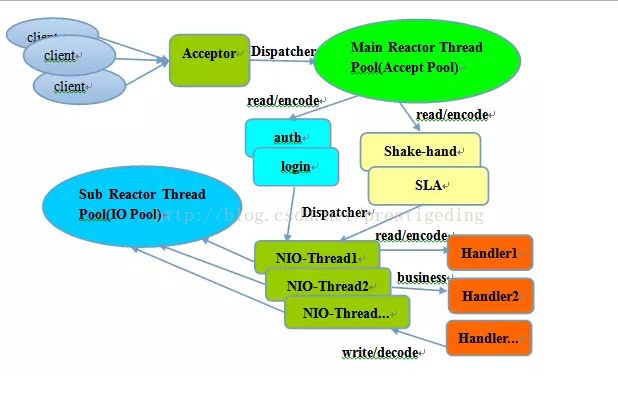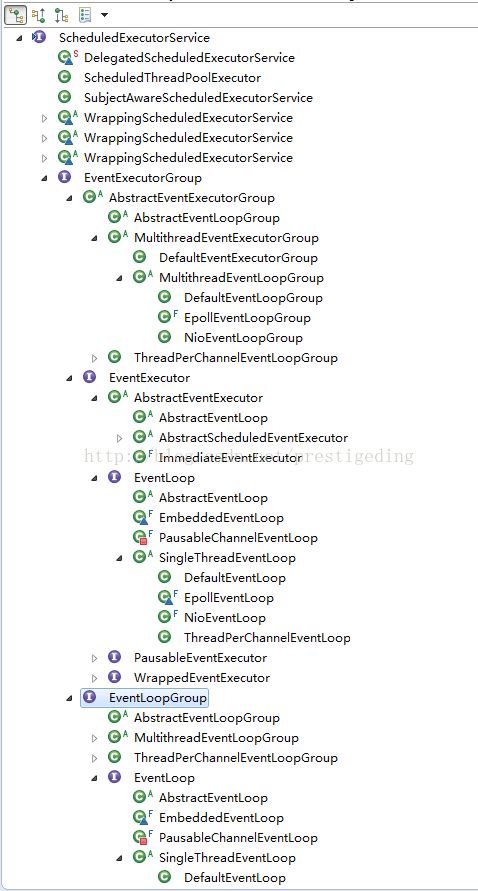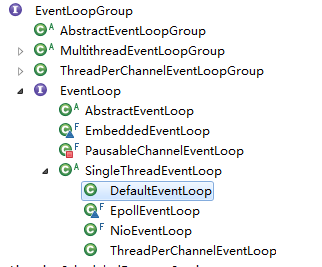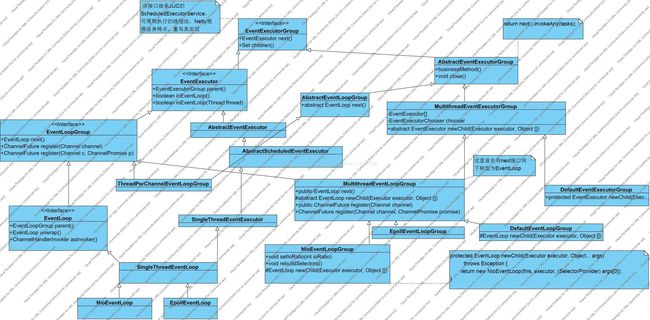Netty学习之旅------图说Netty线程模型
1、图说Netty线程模型
提到Netty的线程模型,我们不得不再重复提到主从Reactor线程模型,Netty线程模型基本上基于主从Reactor模型的实现方式,Netty线程模型将从如下两个图进行展开:
Reactor 主从线程模型
Netty服务端示例代码。
关于Reactor主从多线程模型的讲解,请重点关注Netty 线程模型前置篇,Reactor主从模式源码实现,从Netty服务端示例代码可以看出,Netty的线程模型,必然与EventLoopGroup脱离不了干系。不错,上文中的bossGroup就是相当与Reactor模式中的Main Reactor,而workGroup,则相当于SubReactor。
Netty线程模型类层次结构:
Netty线程模型类继承图:
从如上图可以知道,Netty的线程模型,中有4个基础接口,它们分别是EventLoopGroup、EventLoop、EventExecuteGroup、EventExecute。其中EventExecute扩展自java.util.concurrent.ScheduledExecutorService接口,类似与线程池(执行)的职责,而EventLoop首先继承自EventExecute,并主要扩展了register方法,就是将通道Channel注册到Selector的方法。
NioEventLoop,就是基于Nio的实现。在这个类中有一个亮点,就是规避了JDK nio的一个bug,Selector select方法的空轮询,核心思想是,如果连续多少次(默认为512)在没有超时的情况就返回,并且已经准备就绪的键的数量为0,则认为发生了空轮询,如果发生了空轮询,就新建一个新的Selector,并重新将通道,关心的事件注册到新的Selector,并关闭旧的Selector,其源码实现如下:
private void select(boolean oldWakenUp) throws IOException {
Selector selector = this.selector;
try {
int selectCnt = 0;
long currentTimeNanos = System.nanoTime();
long selectDeadLineNanos = currentTimeNanos + delayNanos(currentTimeNanos);
for (;;) {
long timeoutMillis = (selectDeadLineNanos - currentTimeNanos + 500000L) / 1000000L;
if (timeoutMillis <= 0) {
if (selectCnt == 0) {
selector.selectNow();
selectCnt = 1;
}
break;
}
int selectedKeys = selector.select(timeoutMillis);
selectCnt ++;
if (selectedKeys != 0 || oldWakenUp || wakenUp.get() || hasTasks() || hasScheduledTasks()) {
// - Selected something,
// - waken up by user, or
// - the task queue has a pending task.
// - a scheduled task is ready for processing
break;
}
if (Thread.interrupted()) {
// Thread was interrupted so reset selected keys and break so we not run into a busy loop.
// As this is most likely a bug in the handler of the user or it's client library we will
// also log it.
//
// See https://github.com/netty/netty/issues/2426
if (logger.isDebugEnabled()) {
logger.debug("Selector.select() returned prematurely because " +
"Thread.currentThread().interrupt() was called. Use " +
"NioEventLoop.shutdownGracefully() to shutdown the NioEventLoop.");
}
selectCnt = 1;
break;
}
long time = System.nanoTime();
if (time - TimeUnit.MILLISECONDS.toNanos(timeoutMillis) >= currentTimeNanos) {
// timeoutMillis elapsed without anything selected.
selectCnt = 1;
} else if (SELECTOR_AUTO_REBUILD_THRESHOLD > 0 &&
selectCnt >= SELECTOR_AUTO_REBUILD_THRESHOLD) {
// The selector returned prematurely many times in a row.
// Rebuild the selector to work around the problem.
logger.warn(
"Selector.select() returned prematurely {} times in a row; rebuilding selector.",
selectCnt);
rebuildSelector();
selector = this.selector;
// Select again to populate selectedKeys.
selector.selectNow();
selectCnt = 1;
break;
}
currentTimeNanos = time;
}
if (selectCnt > MIN_PREMATURE_SELECTOR_RETURNS) {
if (logger.isDebugEnabled()) {
logger.debug("Selector.select() returned prematurely {} times in a row.", selectCnt - 1);
}
}
} catch (CancelledKeyException e) {
if (logger.isDebugEnabled()) {
logger.debug(CancelledKeyException.class.getSimpleName() + " raised by a Selector - JDK bug?", e);
}
// Harmless exception - log anyway
}
}
/**
* Replaces the current {@link Selector} of this event loop with newly created {@link Selector}s to work
* around the infamous epoll 100% CPU bug.
*/
public void rebuildSelector() {
if (!inEventLoop()) {
execute(new Runnable() {
@Override
public void run() {
rebuildSelector();
}
});
return;
}
final Selector oldSelector = selector;
final Selector newSelector;
if (oldSelector == null) {
return;
}
try {
newSelector = openSelector();
} catch (Exception e) {
logger.warn("Failed to create a new Selector.", e);
return;
}
// Register all channels to the new Selector.
int nChannels = 0;
for (;;) {
try {
for (SelectionKey key: oldSelector.keys()) {
Object a = key.attachment();
try {
if (!key.isValid() || key.channel().keyFor(newSelector) != null) {
continue;
}
int interestOps = key.interestOps();
key.cancel();
SelectionKey newKey = key.channel().register(newSelector, interestOps, a);
if (a instanceof AbstractNioChannel) {
// Update SelectionKey
((AbstractNioChannel) a).selectionKey = newKey;
}
nChannels ++;
} catch (Exception e) {
logger.warn("Failed to re-register a Channel to the new Selector.", e);
if (a instanceof AbstractNioChannel) {
AbstractNioChannel ch = (AbstractNioChannel) a;
ch.unsafe().close(ch.unsafe().voidPromise());
} else {
@SuppressWarnings("unchecked")
NioTask task = (NioTask) a;
invokeChannelUnregistered(task, key, e);
}
}
}
} catch (ConcurrentModificationException e) {
// Probably due to concurrent modification of the key set.
continue;
}
break;
}
selector = newSelector;
try {
// time to close the old selector as everything else is registered to the new one
oldSelector.close();
} catch (Throwable t) {
if (logger.isWarnEnabled()) {
logger.warn("Failed to close the old Selector.", t);
}
}
logger.info("Migrated " + nChannels + " channel(s) to the new Selector.");
}




